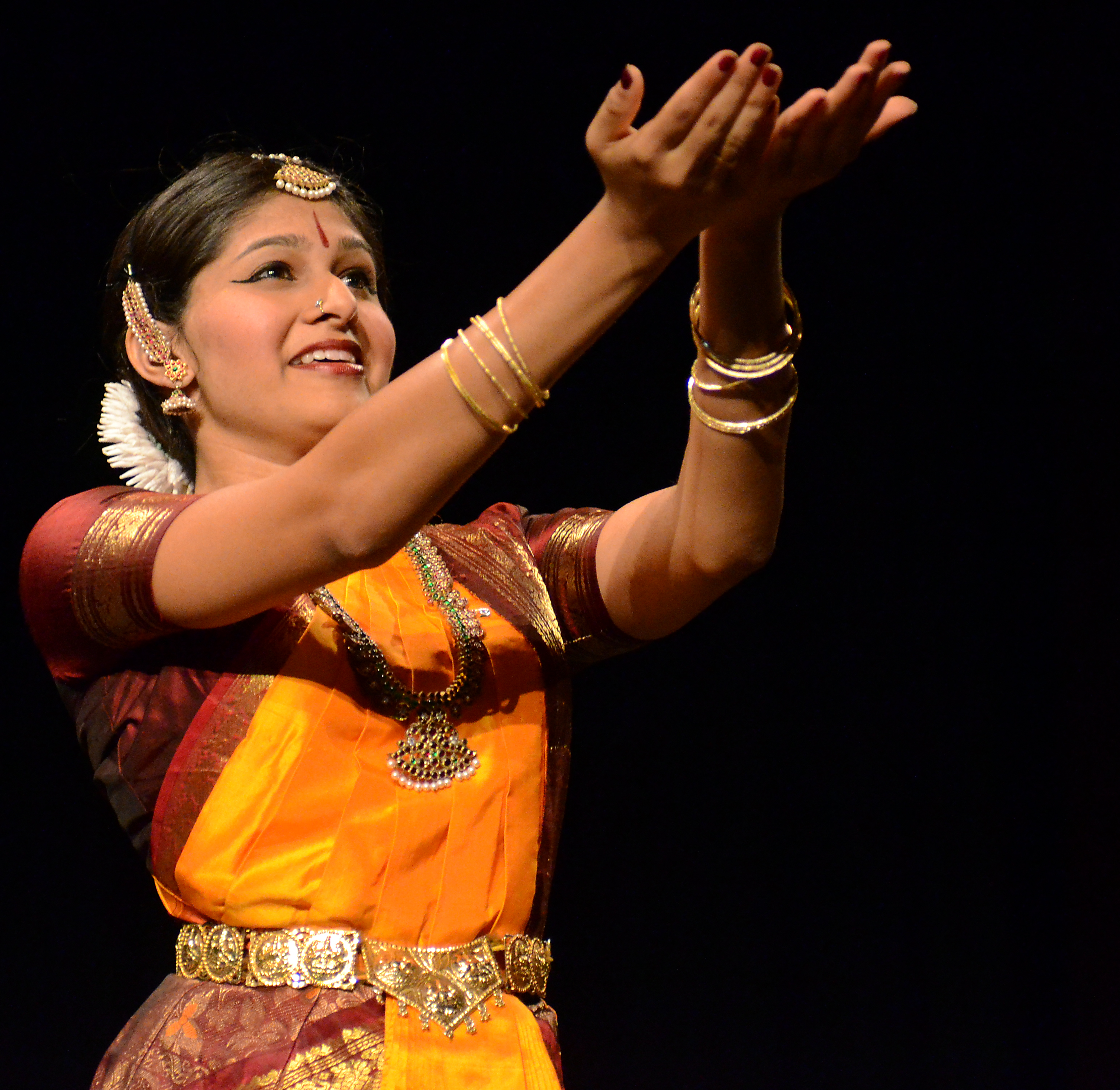UCLA Office of Residential Life hosts Diwali celebration on the Hill, welcoming students of all backgrounds

Chaya Patel, a first-year microbiology, immunology and molecular genetics student, performs Bharata Natyam, a classical Indian dance.
By Ruth Hoey
Oct. 28, 2011 12:48 a.m.

Artists drew temporary henna tattoos on students as part of the Diwali celebration held Thursday evening at the Northwest Campus Auditorium.

First-year physiological science student Janani Muthaiya (left), first-year bioengineering student Diana Berman (middle) and first-year MIMG student Chaya Patel (right) perform a Bharata Natyam dance to celebrate Diwali.
Darkness greeted students assembled in the Northwest Campus Auditorium on Thursday night.
Strains of Indian music filtered through the room, accompanied by flashes of neon glow sticks from invisible dancers. Suddenly the lights came on, revealing sparkling saris as dancers whirled across the stage.
Celebration of the annual Diwali festival ““ a five day celebration that is one of the most important events of the Hindu religious calendar ““ came to the Hill Wednesday and Thursday through the Office of Residential Life.
While last year’s Diwali event was smaller, nearly 300 people attended Thursday’s festivities on the Hill.
The increased scope of this year’s festival represents efforts by the ORL to extend the meaning of Diwali to students of all religious denominations. The events were focused more on the cultural experience, rather than the religious implications of the holiday, said Naina Singh, a fourth-year biochemistry student and one of the organizers of the event.
ORL tried to make the event inclusive to all students, especially because the programming team was made up of people with different beliefs and backgrounds, Singh said.
“We re-enacted a version of a popular Hindu myth, the Ramayana, but we are focused on the essence of the story ““ the fact that light defeats darkness, rather than its religious significance,” Singh said.
This international focus was also meant to create a home atmosphere for residents, particularly international students who are away from home for the first time, Singh said.
Garrett Langston, a third-year theater student, became interested in Indian culture after studying Indian plays in class.
“I came to the event because I really wanted to experience the vibe first-hand,” Langston said.
A music group performing popular Indian songs ““ many of which were sung by members of the audience ““ followed the introductory dance.
After people ate food catered by India’s Oven, a South Asian restaurant, students performed the classical Indian dance Bharata Natyam.
For third-year political science student Ali Sayed, the Diwali celebrations helped him to connect with the Indian part of his culture. Sayed said his father is from Pakistan and his mother is from India.
“My family is based around this complex history between India and Pakistan,” Sayed said. “I’m glad to be here and celebrate an element of my heritage without any tension.”
The same ideas held for a smaller, more intimate approach to the holiday on Wednesday, with a celebration at Delta Terrace.
Hosted by Delta Terrace faculty-in-residence Rashmita Mistry, about 100 students participated in activities and customs associated with the wider Hindu culture, including origami, henna and Bollywood dancing. Some dressed in traditional Indian clothing and enjoyed traditional food prepared by Mistry and the student leaders.
Students of all denominations were encouraged to discuss Diwali, as well as find connections between the festival and their own religious practices, said Mistry, also an associate professor in the department of education.
Mistry said she wanted to share her personal religious holiday with the community of Delta Terrace, where she lives with her husband, Kiran, and 8-year-old son, Millen. She said she got the idea from discussing Diwali with the children in her son’s second grade class.
She said she pitched the celebration to the student leaders of Delta Terrace, who took the idea and planned most of the event.
“Since we don’t have family here, it’s a great way for us to celebrate and share our customs and beliefs with the community that we live in,” Mistry said.
Nirvesh Sikand, a third-year political science student, was one of the student leaders who organized Mistry’s event. Originally from India, he moved to the United States more than four years ago.
He said he jumped at Mistry’s suggestion to hold a Diwali program, as the festival is an important part of his own religious custom.
“At home, we always have lots of people over. We have decorations, food, dancing and fireworks to emphasize the presence of light over darkness,” Sikand said.
Sikand, a Bollywood dancer, said he was eager to describe some of these customs to his fellow students.
“It’s great to be able to share the Indian culture with my friends and the people I live with,” Sikand said.


